Nitecore SC4
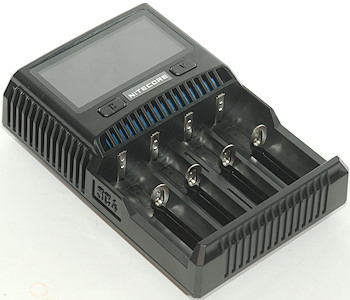
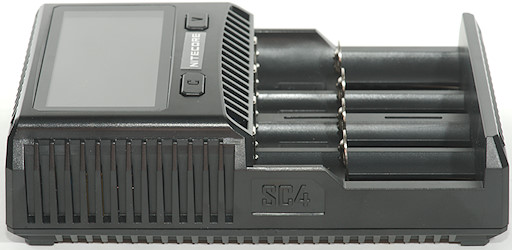
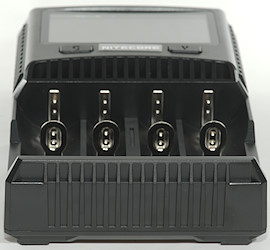
This is a fairly powerful charger from Nitecore that can handle large cells and with a lot of information in the display.
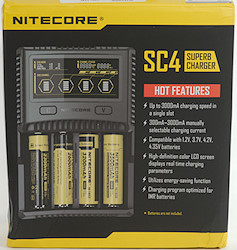

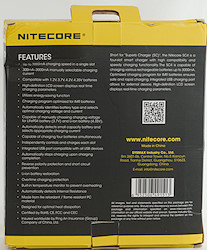

The cardboard box lists lot of specifications, battery types and features.
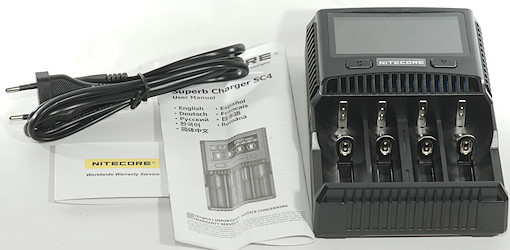
The box contains the charger, a mains cable, manual and a warranty card.
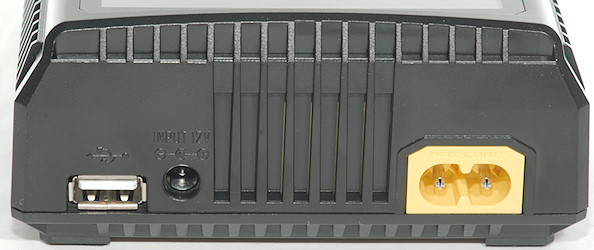
The charger has two power connectors, one for mains input (100-250VAC 50/60Hz) and one for 9-12 VDC input. There is also a usb charger output.
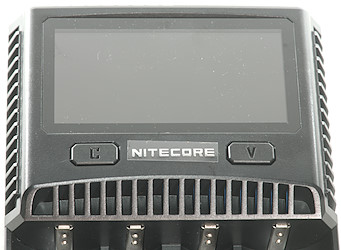
The user interface has two buttons and a advanced looking display.
The display shows chemistry and charge/battery parameters: Volt, mA, mAh, time, Internal resistance
A short press on C will select next battery and also between charge current and chemistry in the settings menu.
A long press on C will enter or leave the current settings menu.
A short press on V will change between the 3 status readouts and in settings menu it will increase current by 0.1.
A long press on V will prioritize that cell (Only possible on slot #1 and #2), this will disable time sharing.
Holding down V in settings menu it will change current rapidly
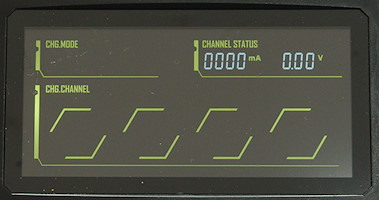
This is the idle display.
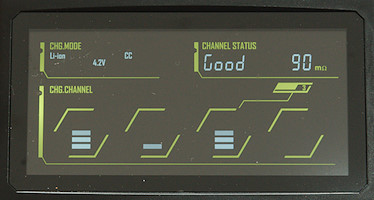
Charger is working on 3 batteries, top line is for battery 3 and shows internal resistance.
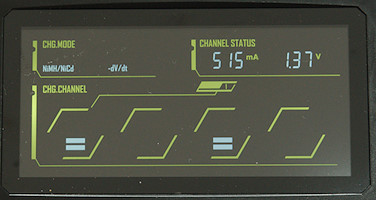
Here top line is for battery 1 and it shows current and voltage.
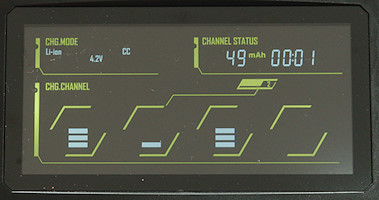
Top line is for 2 and it shows mAh and time.
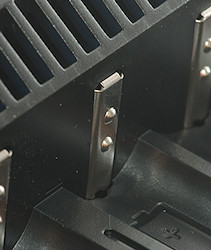
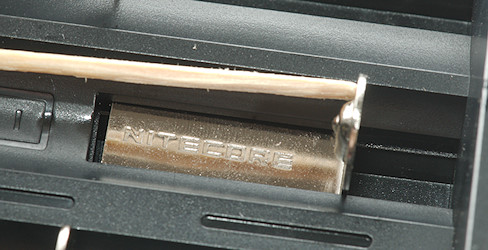
The slots uses the usual construction and works well. They can handle batteries from 28mm to 70.3mm long.
Notice the long bar at the plus end, due to this the charger can handle anything up to D or 32xxx size.
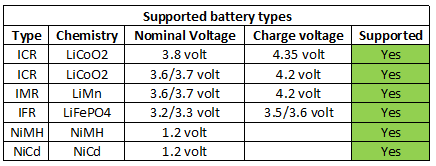
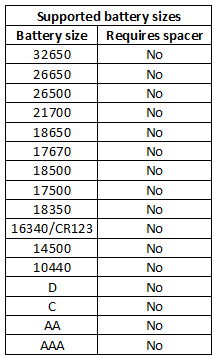
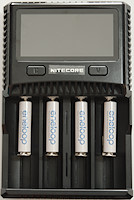
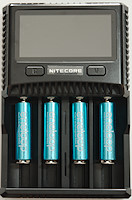
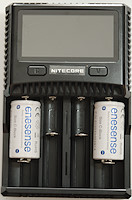
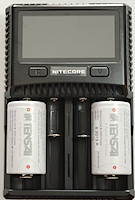
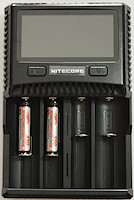
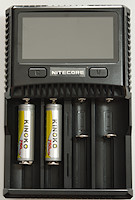
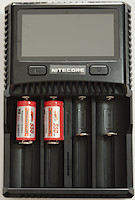
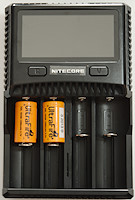
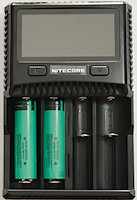
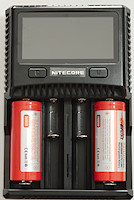
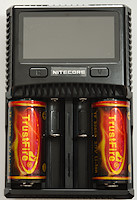
The charger can handle 70 mm long batteries, inclusive flat top cells.
Measurements
- Charger will charge a LiIon with 0.2mA when full.
- Charger will discharge a LiIon with 0.7mA when not powered.
- Charger will discharge a NiMH with 0.15mA when not powered.
- Charger will change between 0.5A and 2A at around 54mm
- Slot #1 and #3 will time share
- Slot #2 and #4 will time share
- Using the prioritize function will disable time sharing and instead charge them in sequence.
- When one of the shared slots is full all current is directed to the other slot.
- Below 0.8V a single restart pulse is tried.
- Between 0.8V and 1.7V NiMH is assumed
- Between 1.7V and 2.0V an error is reported.
- Above 2.0V LiIon is assumed
- Voltmeter is within 0.01V in the full range.
- Voltmeter will stop updating when charging is stopped.
- Charger will not restart if battery voltage drops.
- Charger will restart if battery is removed or power is cycled.
- Usb output is only active when not charging.
- Power consumption when idle with display dimmed is 0.54 watt
4.2V LiIon charging
Charge current can be selected from 0.3A to 3A in 0.1A steps.
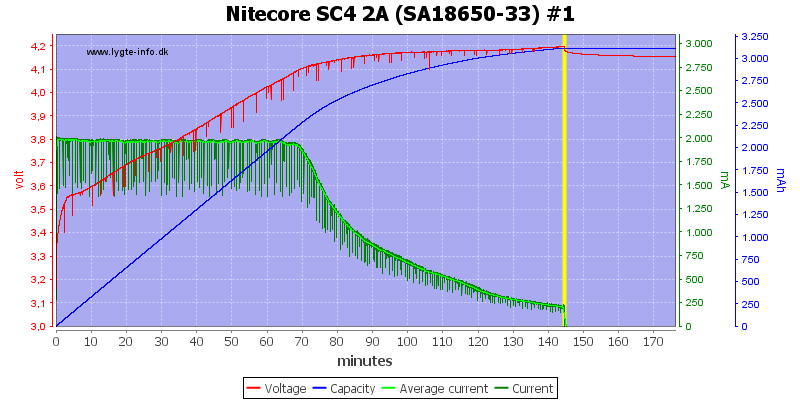
Charging is a nice CC/CV curve with termination around 250mA
Display shows: 3097mAh 136mOhm
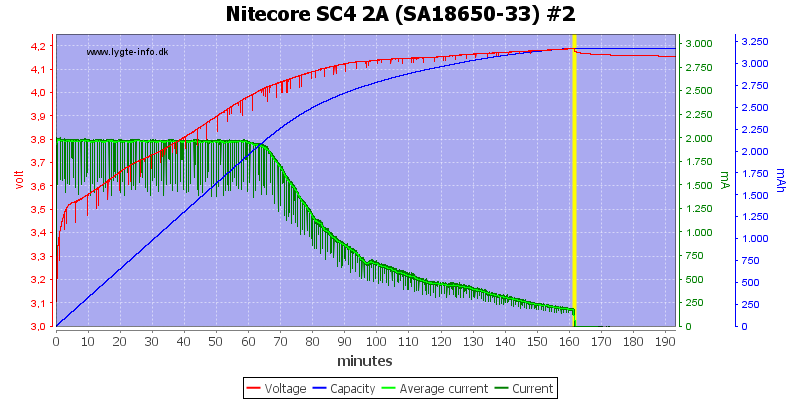
Display shows: 3133mAh 82mOhm
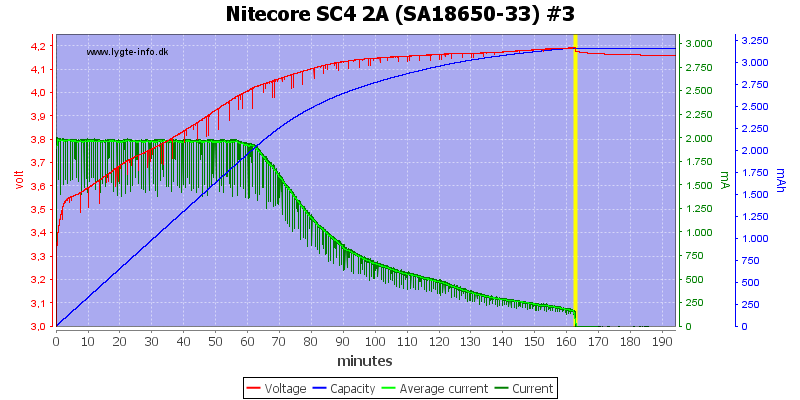
Display shows: 3116mAh 93mOhm 2:42
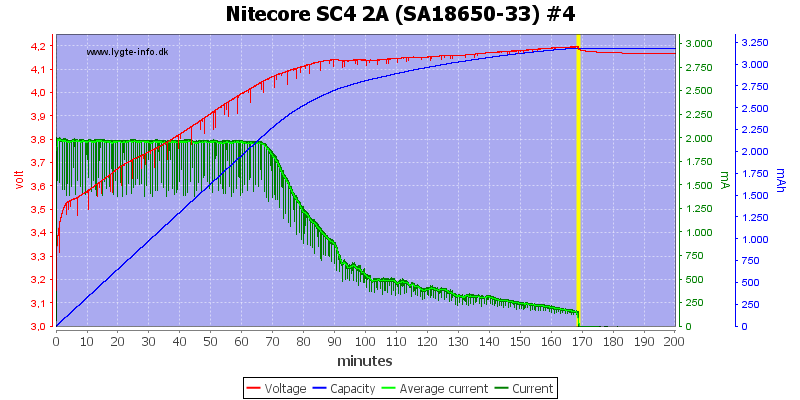
The 3 other slots looks similar.
Display shows: 3132mAh 56mOhm 2:48
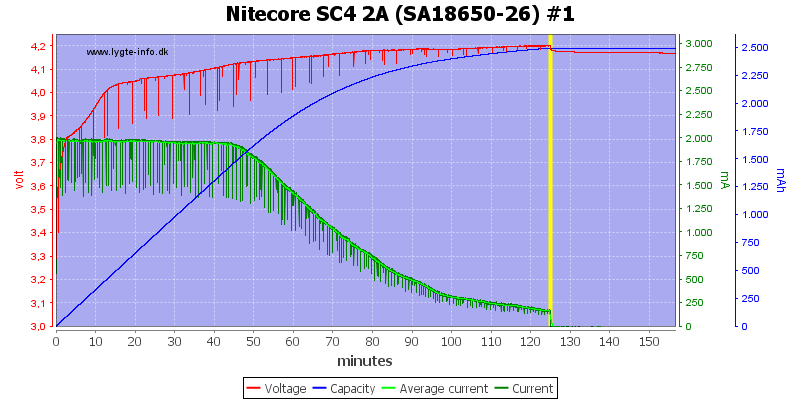
Display shows: 2460mAh 66mOhm 2:05
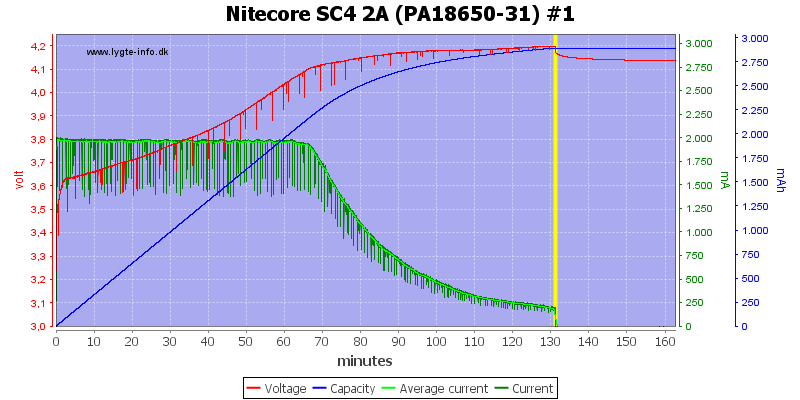
And also the 2600mAh and 3100mAh cells.
Display shows: 2883mAh 54mOhm 2:11
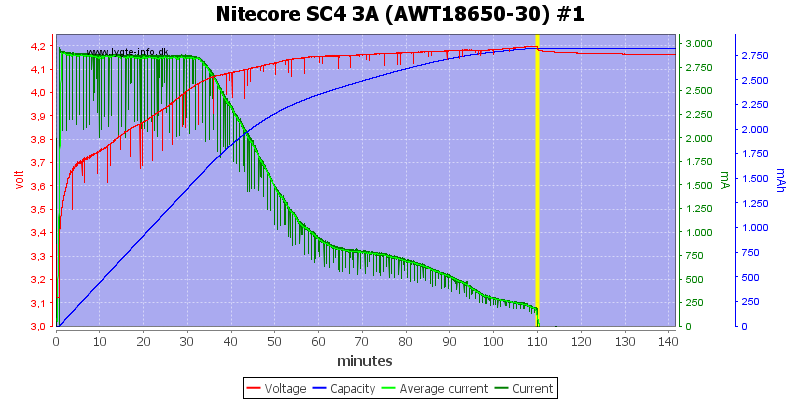
With 3A charge current the charger spend a lot of time in the CV phase.
Display shows: 2863mAh 115mOhm 1:49
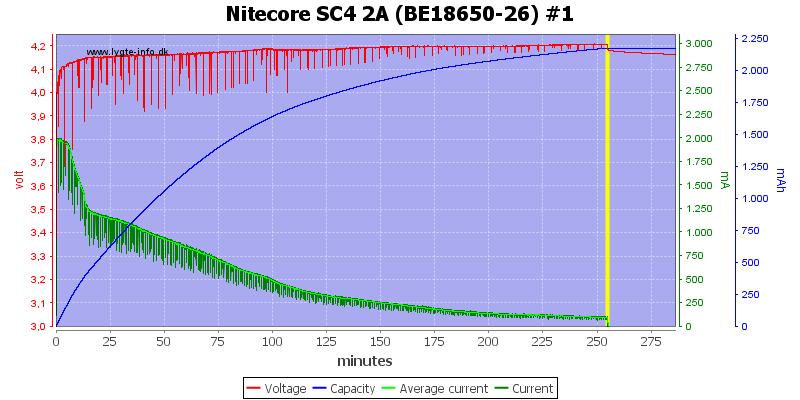
With an older cell the termination current is reduced, this is probably because this is a sort of simulated CC/CV charge.
Display shows: 1947mAh 205mOhm 4:15
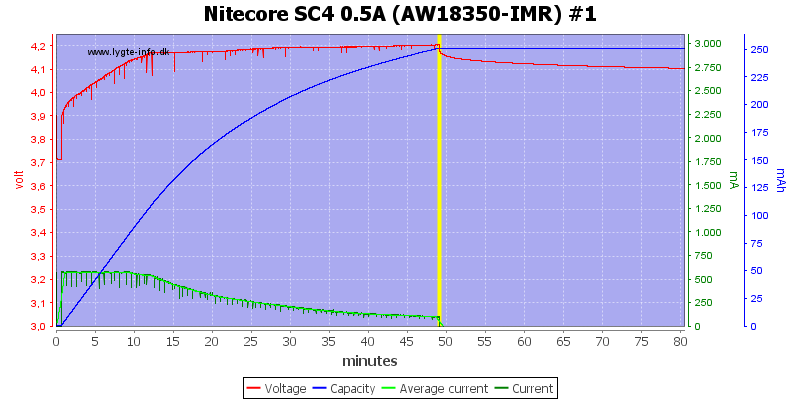
Even this very old and worn down cell is handled nicely and today it has a fairly low internal resistance?
Display shows: 200mAh 153mOhm 0:48
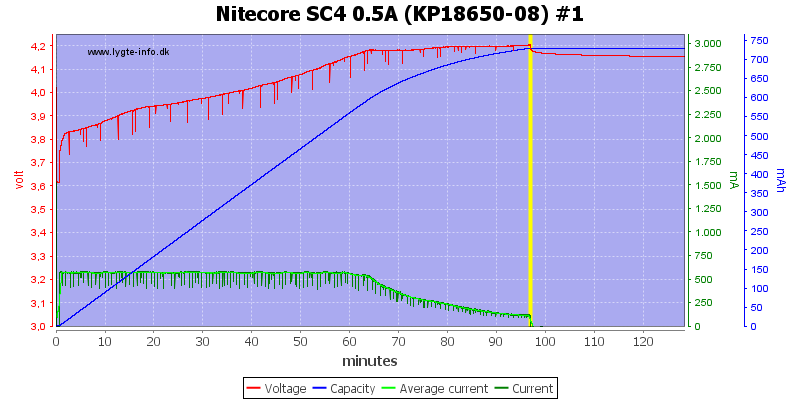
A 14500 cell is charged fine.
Display shows: 639mAh 277mOhm 1:36
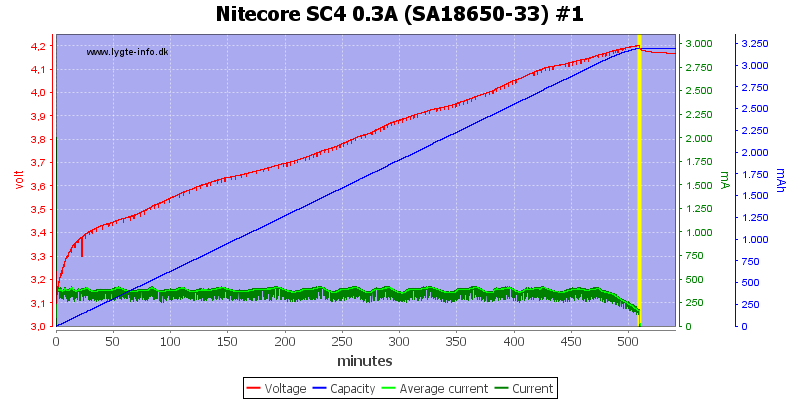
The low current charge also works nicely.
Display shows: 2916mAh 55mOhm 8:29
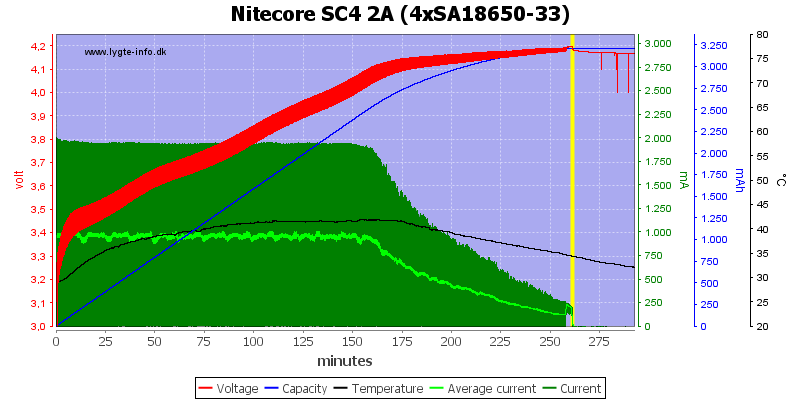
With 4 cells the current is half the selected current, the charge looks fine enough.
Display shows: 3299mAh 55mOhm 4:21, 201mAh 55mOhm 4:10, 68mAh 56mOhm 4:18, 66mAh 43mOhm 4:09
I did not make an error in the above, only the first slot shows correct capacity. As can be seen on the charge time the other slots where charged with similar amount of current, but the mAh counter must have a software bug.
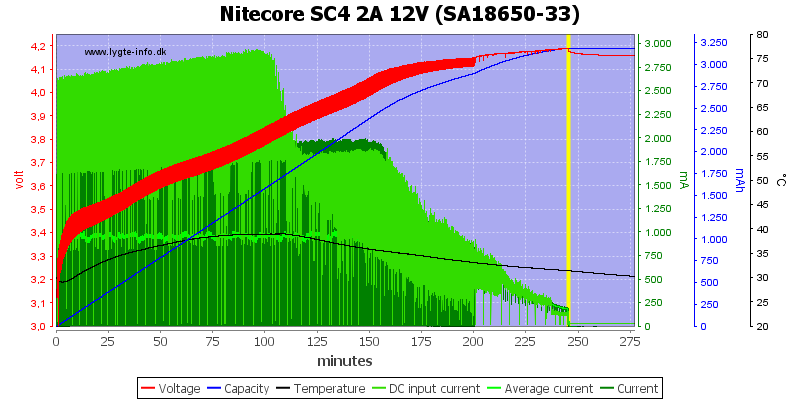
The charger uses up to 3A in peak current from the 12V power supply to charge with 2A, not very nice.
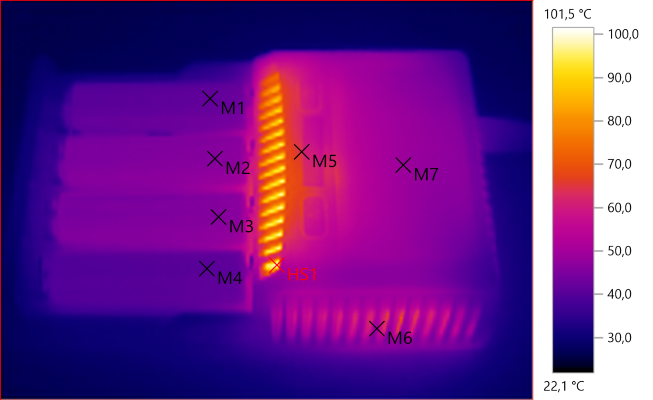
M1: 41,8°C, M2: 46,1°C, M3: 46,0°C, M4: 40,7°C, M5: 64,4°C, M6: 50,1°C, M7: 49,2°C, HS1: 101,5°C

M1: 41,1°C, M2: 45,7°C, M3: 45,3°C, M4: 39,7°C, M5: 63,2°C, HS1: 71,9°C
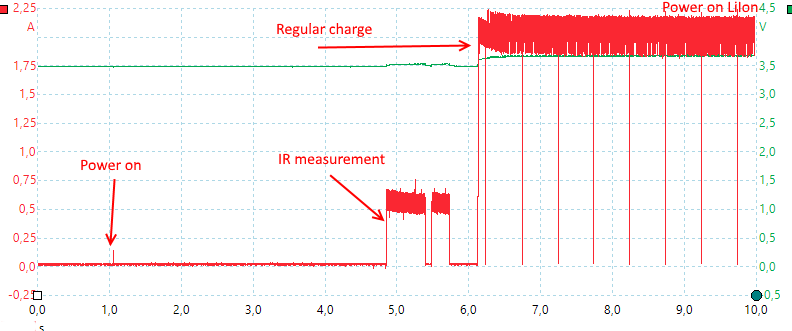
THe charger needs about 5 seconds to start, this includes the starting animation on the display and measuring internal resistance of the batteries.
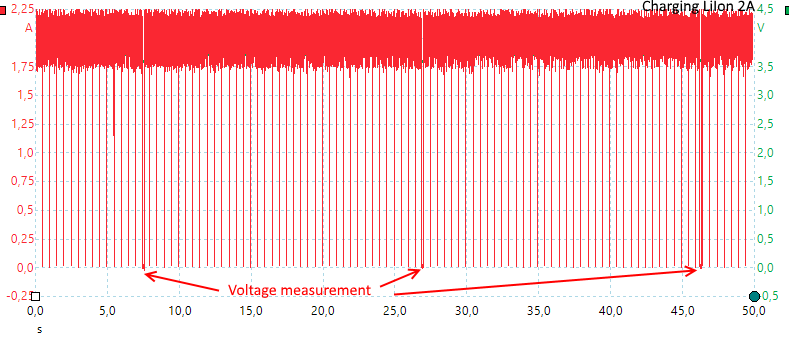
When charging there is a short pause every 20 seconds.
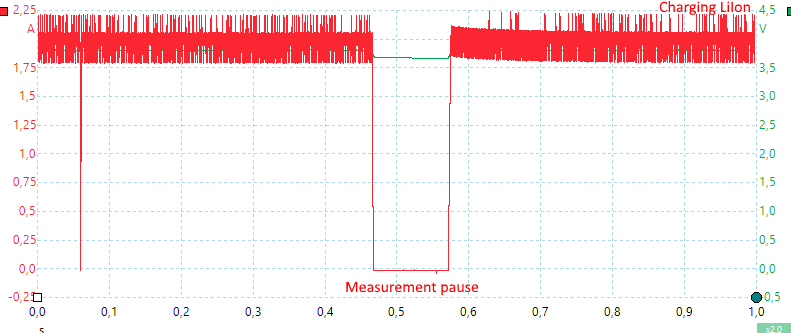
This pause is 0.1 second long and the charger probably uses it to measure the battery voltage.
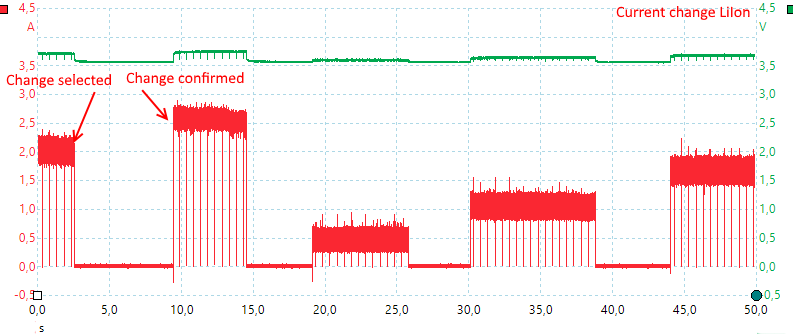
It is possible to change charge current at any time, just hold the C button down to select adjustment mode.
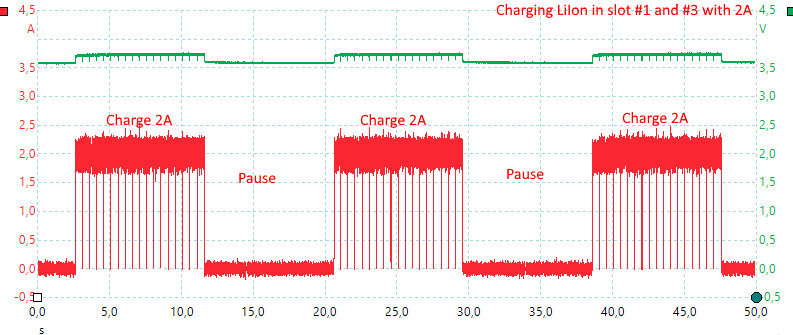
The charger uses time sharing, this means effective charge rate is half of selected rate when using shared slots.
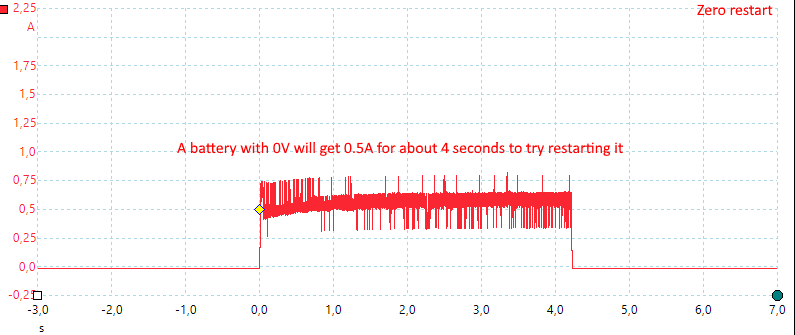
If a battery with 0V is put into the charger it will try to restart the battery with a single current pulse.
3.6V LiIon charging (LiFePO4)
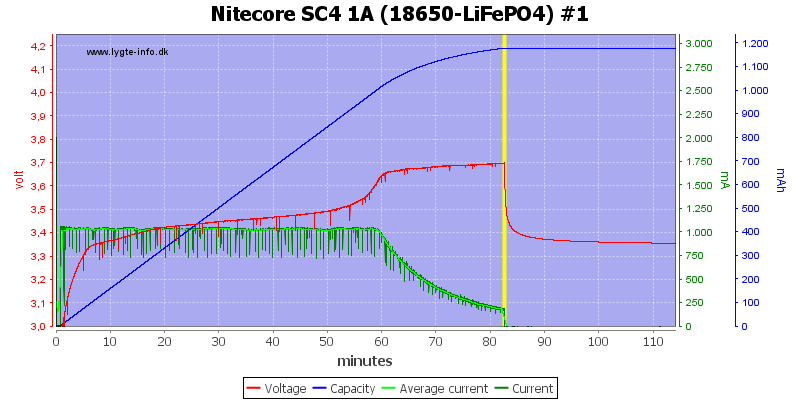
Display shows: 1124mAh 73mOhm 1:21
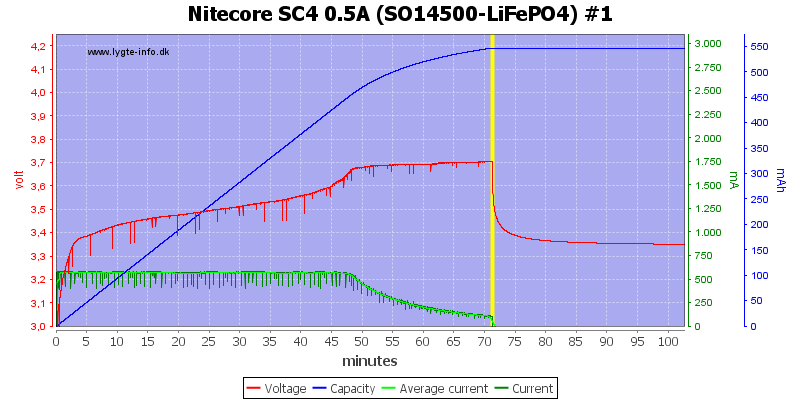
The charger handles LiFePO4 batteries correctly.
Display shows: 478mAh 130mOhm 1:11
4.35V LiIon charging
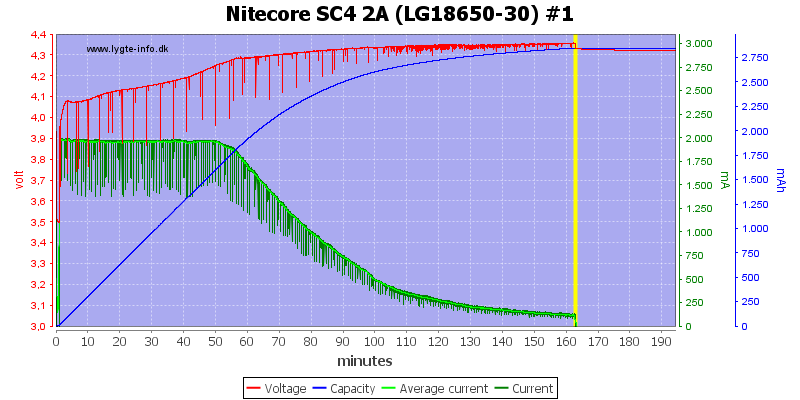
The 4.35V charging looks fine.
Display shows: 2799mAh 201mOhm 2:42
NiMH charging
Charge current can be selected from 0.3A to 2A in 0.1A steps.
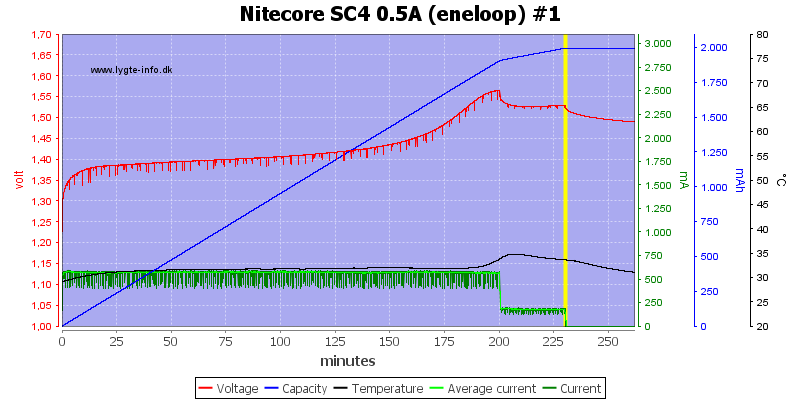
Default charge current for NiMH is only 0.5A, the charger stops when the battery is about full and then supplement with a 30 minute top-off charge at 200mA. There is no trickle charger.
Display shows: 1715mAh 60mOhm 3:20
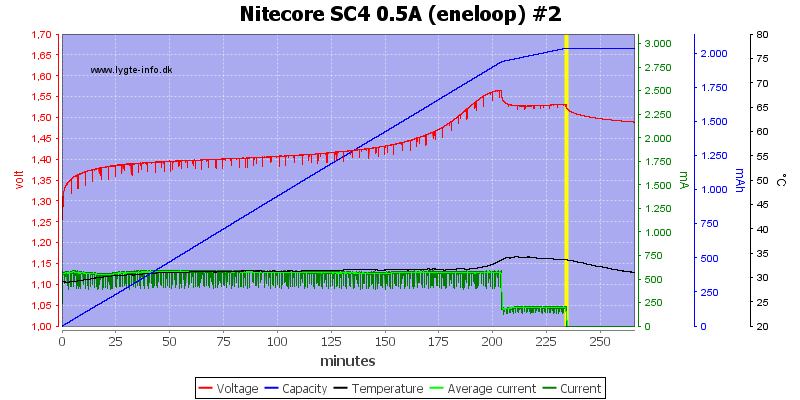
Display shows: 1746mAh 64mOhm 3:24
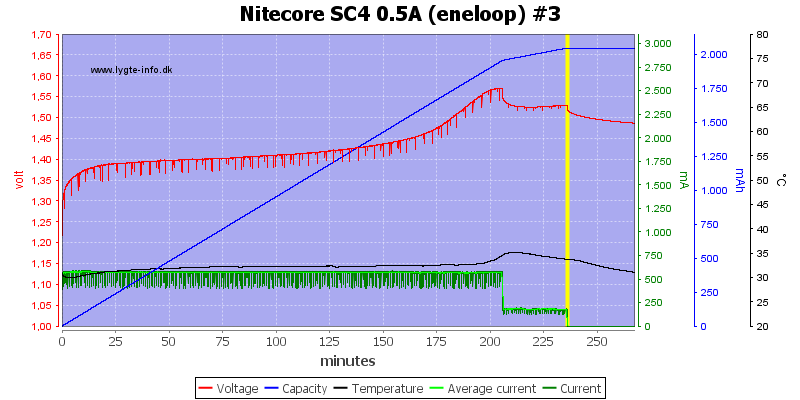
Display shows: 1763mAh 163mOhm 3:26
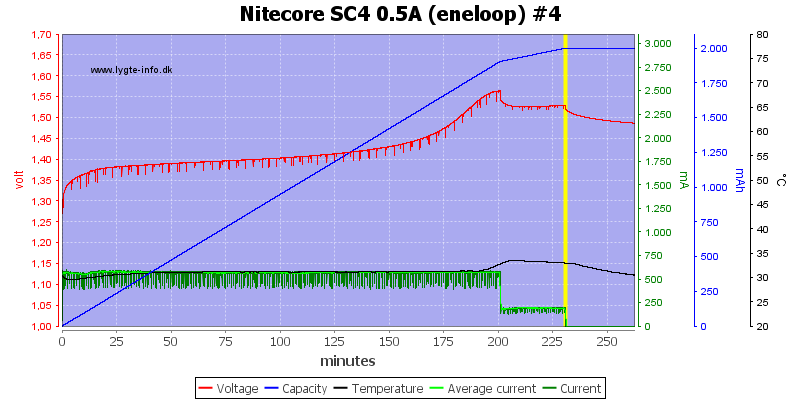
The other 3 channels works the same way, each stop when the battery starts heating up and then gives it a top-off charge.
Display shows: 1721mAh 164mOhm 3:21
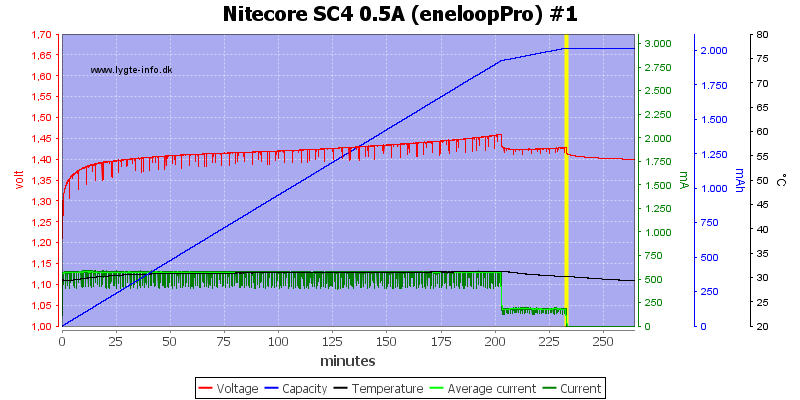
Display shows: 1735mAh 186mOhm 3:22
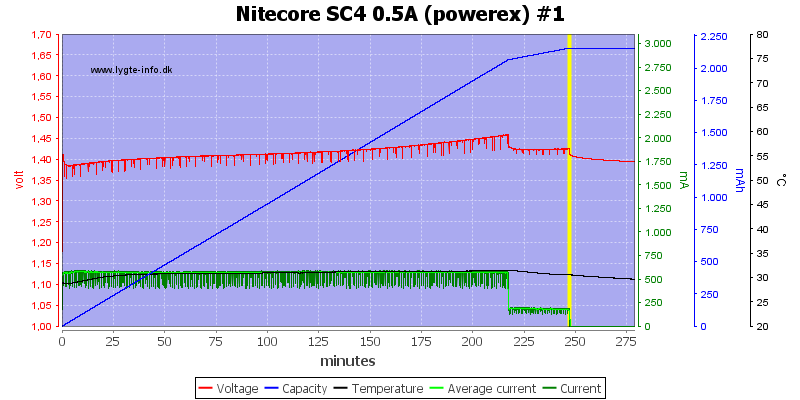
I wonder what termination the charger uses here, but it terminates to early.
Display shows: 1859mAh 78mOhm 3:37
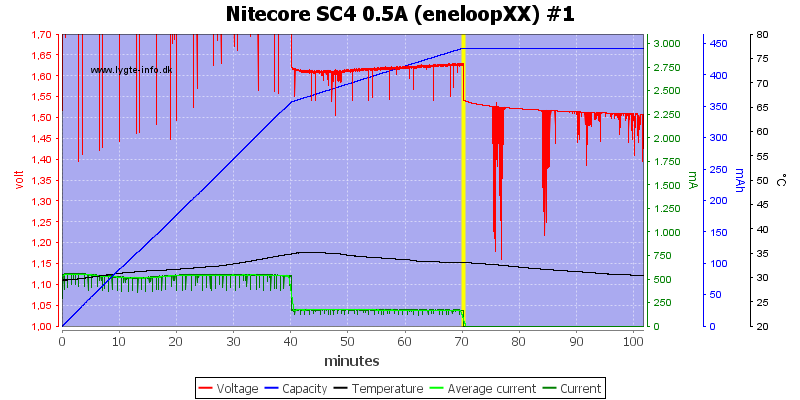
This worn down cell gets 40 minutes regular charging and 30 minutes top off charging.
Display shows: 317mAh 629mOhm 0:40
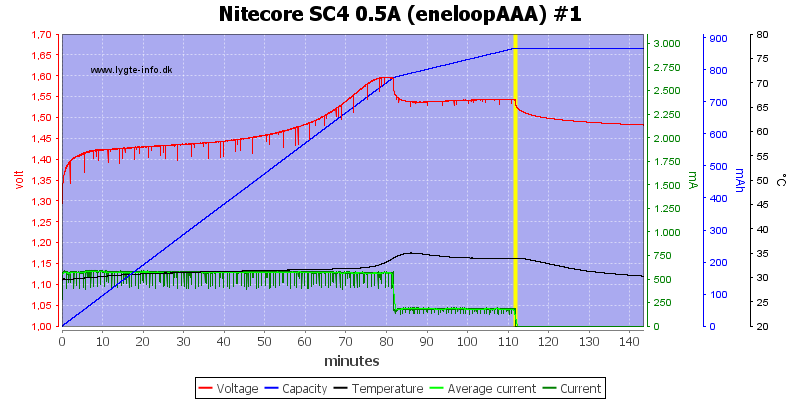
The AAA is charged nicely.
Display shows: 700mAh 107mOhm 1:21
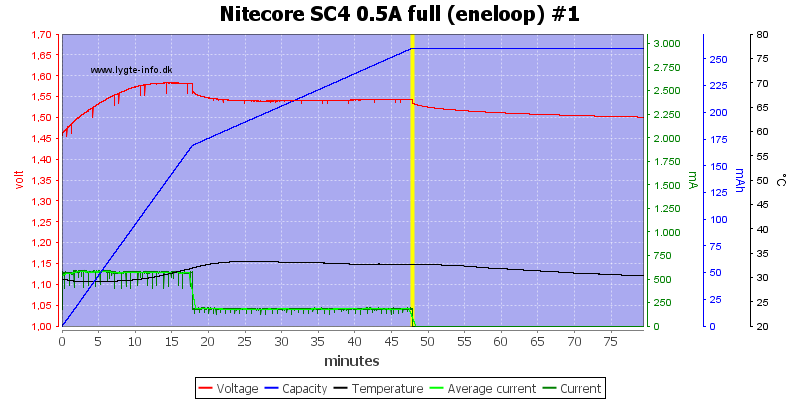
The full cell is detected after about 17 minutes and it also gets a top-off charge.
Display shows: 152mAh 52mOhm 0:17
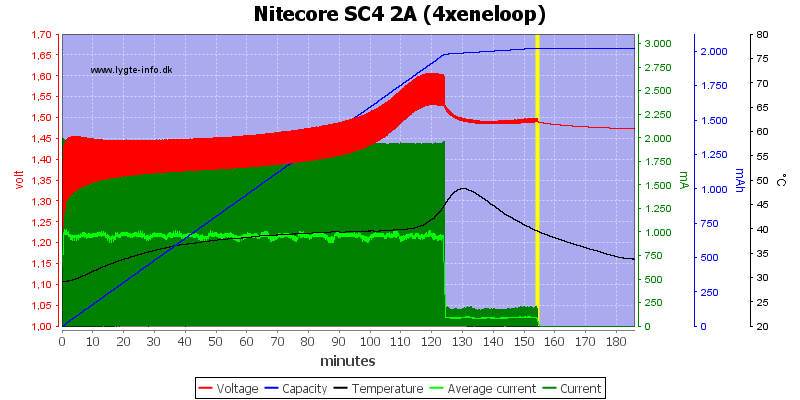
Time sharing is also active with NiMH, i.e. current is again half of the selected current.
Display shows: 2061mAh 58mOhm 2:04, 102mAh 53mOhm 2:05, 101mAh 66mOhm 2:06, 100mAh 58mOhm 2:04
Again a problem with capacity display, only the first cell show correctly.
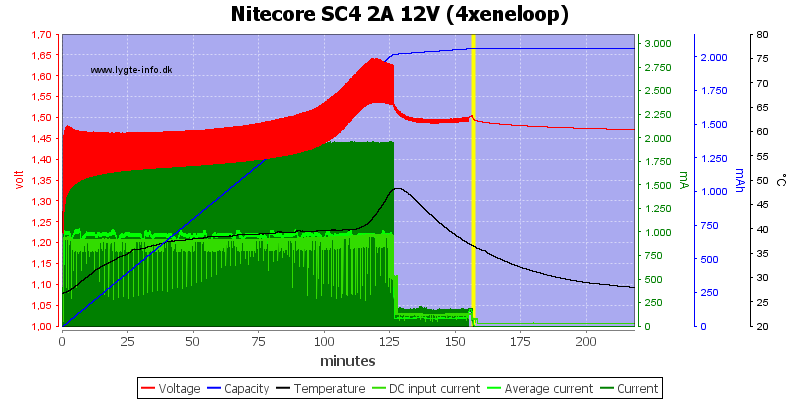
For 4xAA it need less than 1A from 12V and here is a very obvious -dv/dt termination.
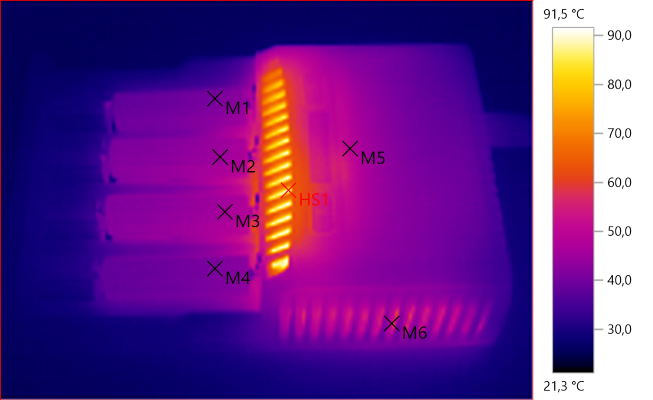
M1: 40,8°C, M2: 45,0°C, M3: 46,2°C, M4: 41,4°C, M5: 49,8°C, M6: 52,0°C, HS1: 91,5°C
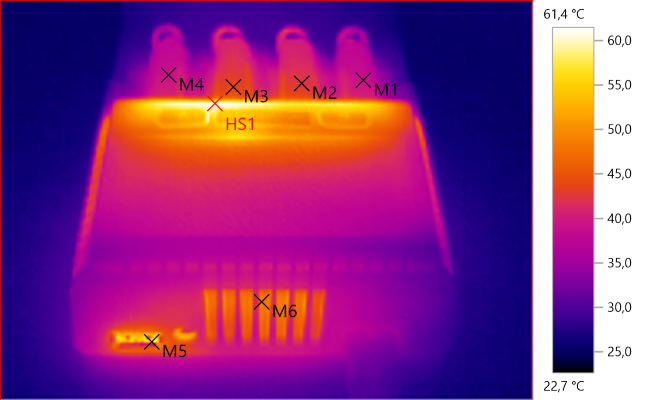
M1: 39,2°C, M2: 42,6°C, M3: 43,7°C, M4: 39,4°C, M5: 55,1°C, M6: 49,0°C, HS1: 61,4°C
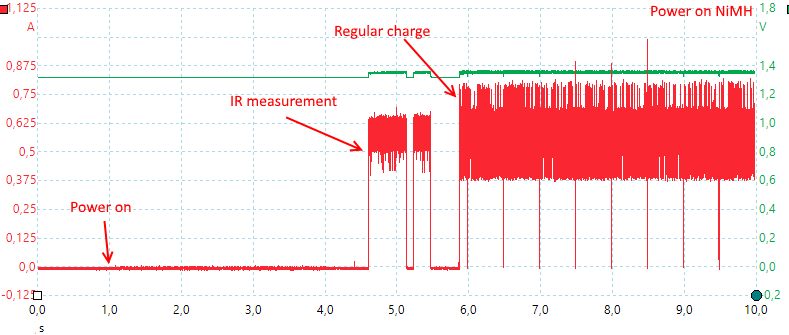
The charger needs about 5 seconds to start up, this includes the internal resistance measurement.
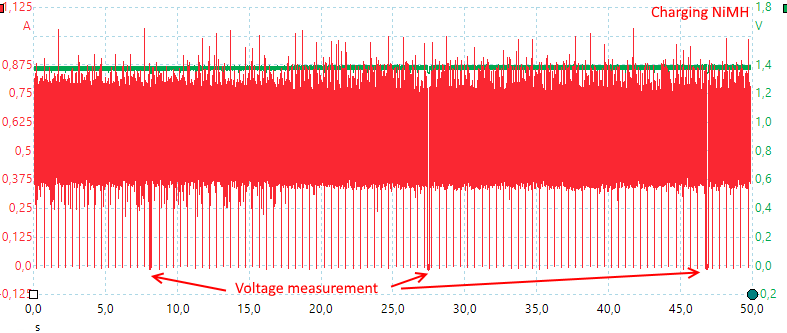
The charger pause at regular intervales during charge, probably to measure voltage.
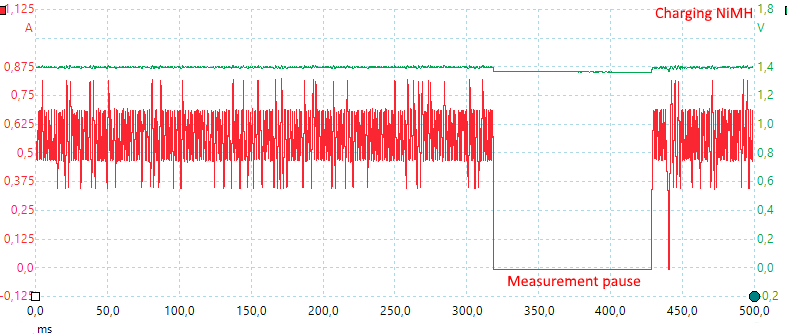
The pause is about 0.1 second.
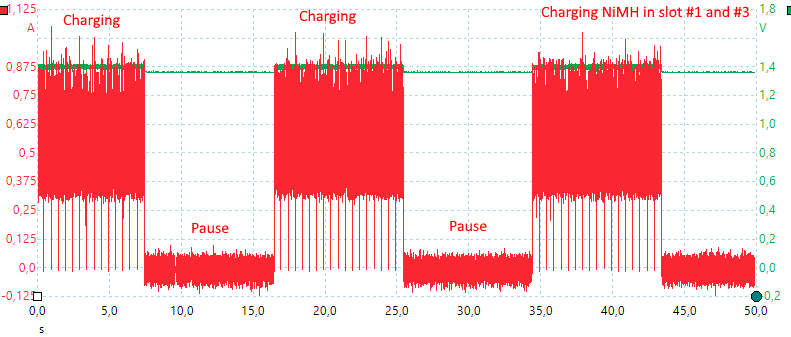
The time sharing.
Internal resistance measurement
One of the parameters the charger measures is internal resistance and it also gives a good/bad evaluation of the cell.
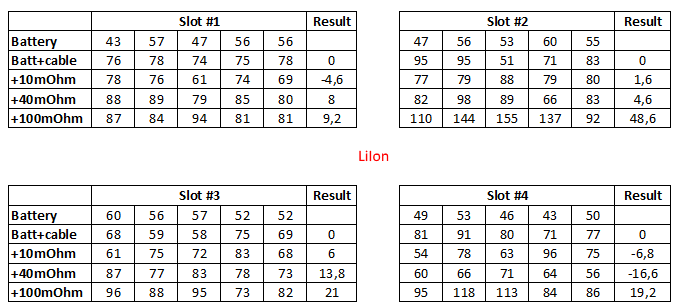
I cannot see any useable values in this result.
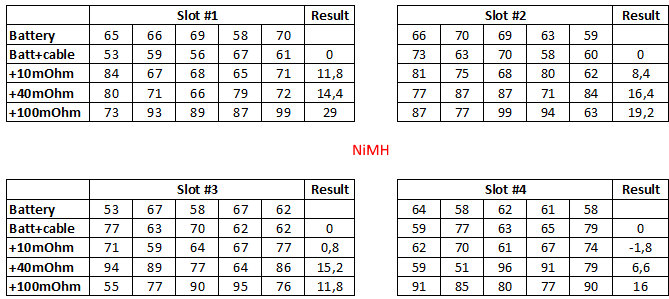
Same goes for NiMH.
USB charger
- Usb output is coded as usb charger (DCP)
- Usb output is only active when not charging.
- Power consumption when idle with display dimmed is 0.54 watt
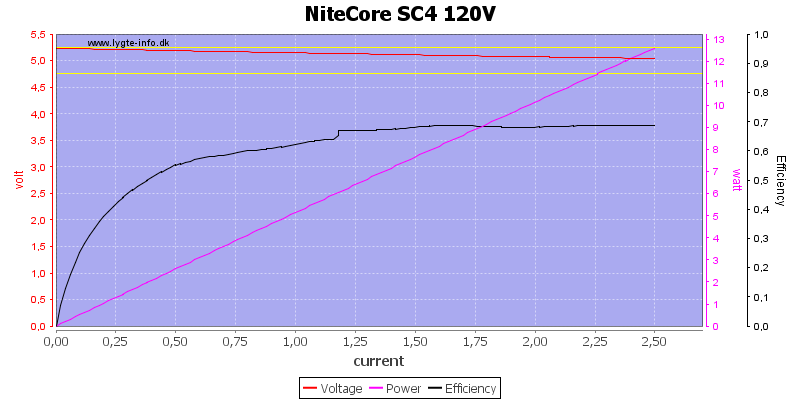
At 120VAC the charger can deliver about 2.5A on the usb output before overload protection kicks in.
I have cleaned the curve, because at overload the charger turns off, then on, then off, ...
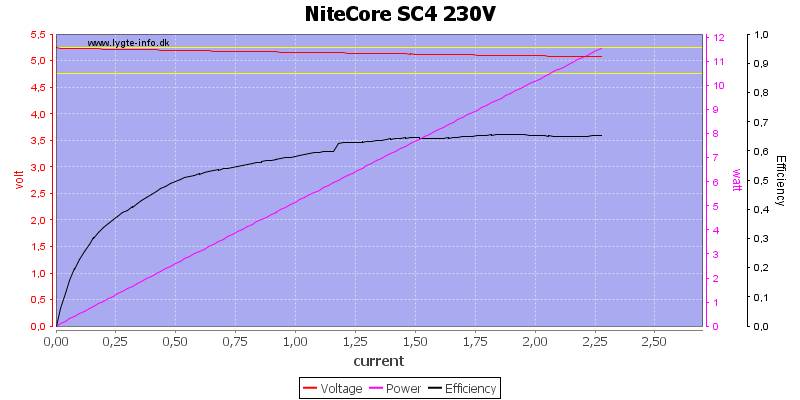
At 230VAC the charger can "only" deliver 2.25A before overload protection kicks in.
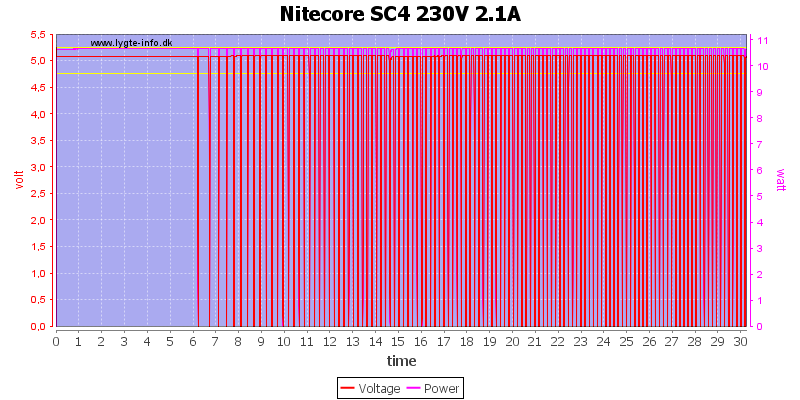
But it cannot deliver 2.1A (rated current) for one hour, it could only handle that for about 6 minutes.
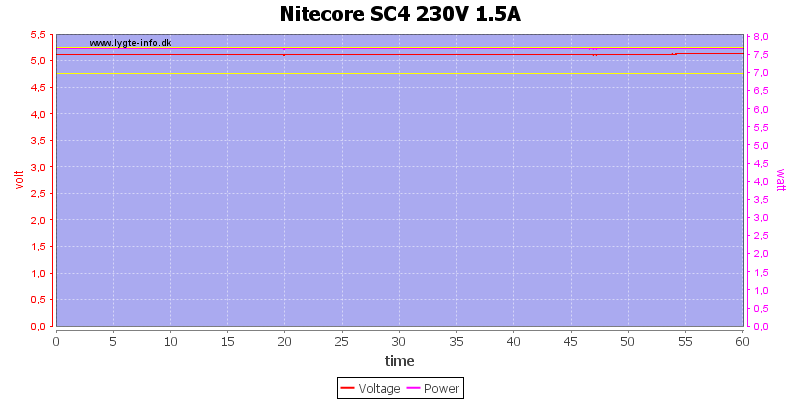
I reduce the current to 1.5A and the charger had no problems with delivering the current for one hour.
The temperature photos below are taken between 30 minutes and 60 minutes into the one hour test.
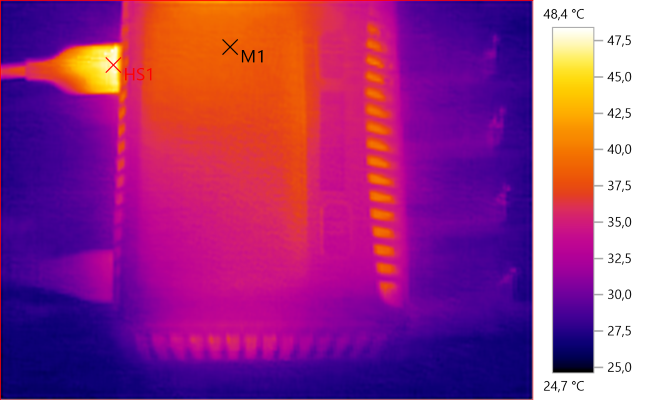
M1: 38,7°C, HS1: 48,4°C
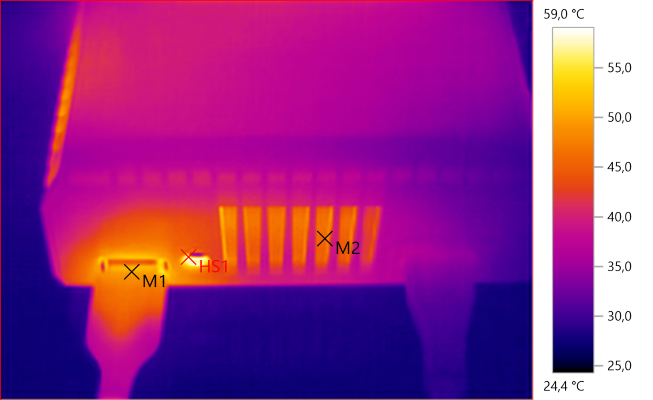
M1: 50,3°C, M2: 45,7°C, HS1: 59,0°C
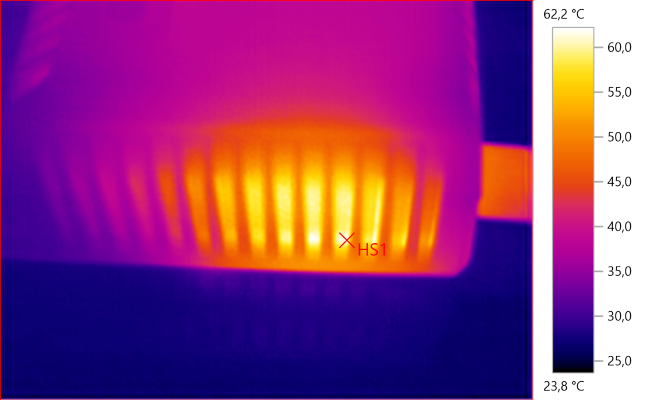
HS1: 62,2°C
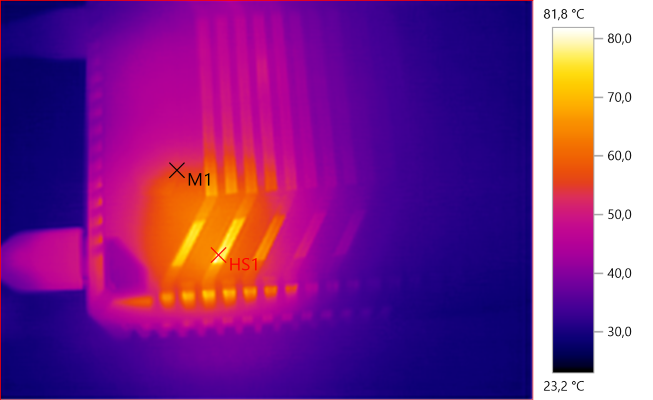
M1: 55,1°C, HS1: 81,8°C
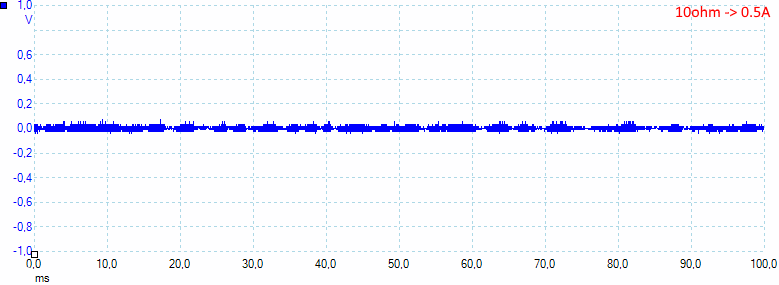
Noise is 22mV rms and 126mVpp
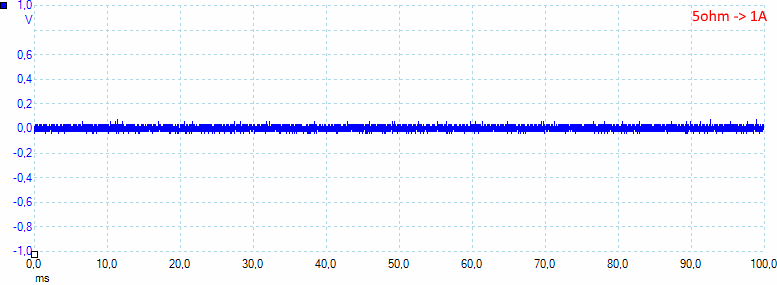
Noise is 23mV rms and 181mVpp
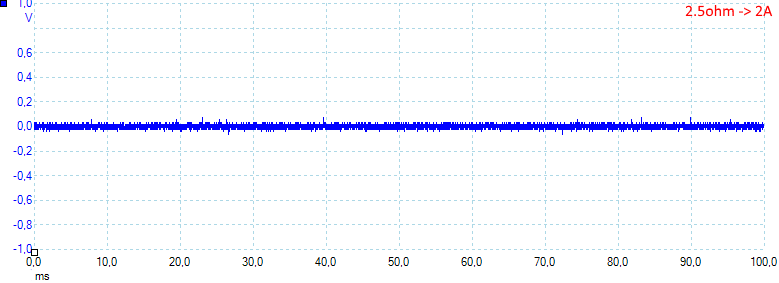
Noise is 18mV rms and 147mVpp
Testing with 2830 volt and 4242 volt between mains and low volt side, did not show any safety problems.
Conclusion
The charger is very good when charging LiIon, but the silent halving of charge current when time sharing it not that nice.
For NiMH is works perfectly with 2000mAh eneloops, but the high capacity cells are terminated premature, again it has the lower charge current when time sharing.
The internal resistance do not really work when testing it.
The mAh display is not that precise in all situations and faulty when charging 4 batteries.
The usb charger output works fine, but cannot deliver the rated current. The current is fine compared to the coding of the usb.
Due to the different problems I will only rate the charger as fairly good.
Notes
The charger was supplied by a banggood.com for review.
When idle the charger is a bit noise.
Here is an explanation on how I did the above charge curves: How do I test a charger


















































































